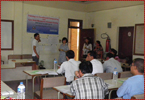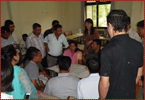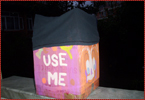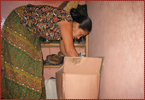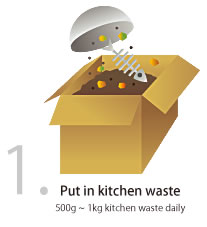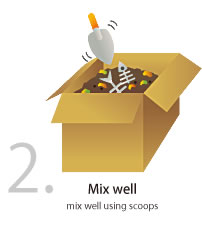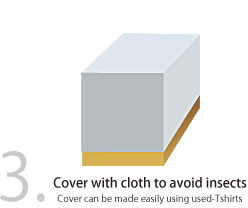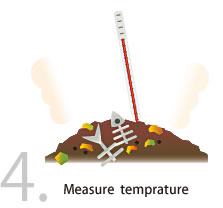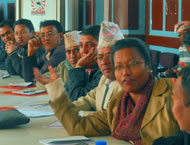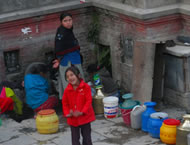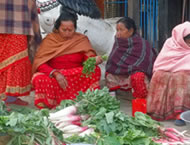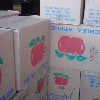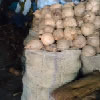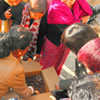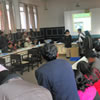Further up-scaling of the Cardboard Box Composting Training was conducted in Kathmandu, Nepal in June 2010. This time, the objective of the training was ‘ToT,’ (Training of Trainers), for municipality staff who would actually be introducing and ‘teaching’ the people and the communities how to practice cardboard box composting at the household levels. The TOT was conducted for two days, where the twenty municipality representatives (the ‘to-be’ trainers) of eight municipalities participated and learned how to mobilize the community, various tips on how composting can be used as a tool in environmental education in primary and secondary schools, and as part of community development activities, in addition to the techniques and knowledge on composting. The Cardboard Box Composting is now being implemented on a pilot scale with 300 first households in Baglung municipality and is expected to expand further.
The municipality has selected three communities to introduce cardboard composting in their households as a part of managing waste at source. Introduction of this new technology in these three communities has become talk of the town. In regards of cardboard composting experience sharing among neighborhood has become the daily routine. The experimentation phase is ongoing. Along with introduction of cardboard composting, other household level waste management initiatives like source separation, recycling, and collection of plastics. With the experience of the first phase cardboard composting, the municipal officials are quite motivated with the successful experiences and looking forward to expand it in more communities of the municipality.
This successful demonstration of cardboard composting will be a model case for replication for other municipalities of Nepal.
* Click here for enlarged photo
One of the technologies introduced at the EGM was 'cardboard box composting'. While composting itself is familiar to many cities and towns in Asia, the concept of utilizing used cardboard boxes with locally available materials was an innovative yet very feasible solution for many cities which face serious waste management and collection issues. Among the cities who expressed keen interest in adopting the method on a trial basis, UN-HABITAT ROAP, in cooperation with UN-HABITAT Water and Sanitation Team, decided to conduct a composting workshop in Kathmandu, Nepal. The workshop was held jointly with the Government of Nepal, inviting total 40 solid waste representatives from municipalities.
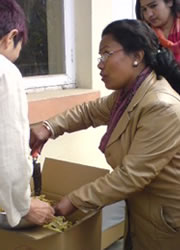
Japan
NPO Junnamaken
* Click here for enlarged photo
* Selected photos by Junnamaken
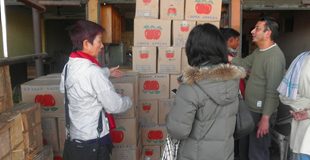
![]()
The quantity of solid waste is progressively increasing every year in all the municipalities and in emerging towns mainly due to population and economic growth and rapid urbanization. Yet, financial resources as well as trained human resources for the needs of overall management of urban waste are seriously constrained. The major portion of the annual municipal budget is expended just to sweep, collect, transport and dump the waste without any consideration to environmental and social measures. Management of solid waste is extremely sensitive at the operational level, and is often labour intensive, thus resulting in high operating costs, particularly for the collection and disposal activities.
Nepal's municipal waste mainly consists of organic waste (60-70%) which is also considered as one of most difficult to handle element. Municipalities had initiated various household level and community based options like bucket/drum/box composting, vermin composting, and community composting to address the problem. However no significant results have been marked to the date. The major reason behind this may be due to insufficient education and awareness programmes at household level or may be due to the technology/method introduced, is not simple and practical enough in local context.
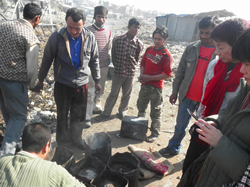
In this context, UN-Habitat Regional Office for Asia Pacific (ROAP), Solid Waste Management and Resource mobilization Center (SWMRMC), and UN-Habitat Nepal had jointly organized a three day workshop on '' Sharing of Knowledge on Cardboard Composting'' from February 9-11, 2010. The main aim of this workshop is to introduce simple technology of managing kitchen waste through cardboard composting practiced massively in Japan. The workshop was participated by key municipal staff of more than 30 municipalities of Nepal, NGO and private sector.
One of the major outcomes of this workshop is that the participants found this technology/method quite simple to be promoted at their respective municipalities, which is simpler than the methods practiced in Nepal so far. This has brought high level of enthusiasm among the municipal participants and is quite eager to introduce this method in their respective municipalities. Beside the technology/method, the materials required to initiate the composting can be made available locally with very little cost implication utilizing locally available materials.
The knowledge gained by this workshop is very valuable and practical as well as it is the first of its kind introduced for individuals participated in the workshop. The technology itself is quite simple that municipalities of Nepal can easily promote and replicate it to address the most ''difficult to handle'' organic waste. Even during the workshop itself most of the municipalities planned to promote the technology immediately. Baglung municipality had already initiated this technology in 200 households as a pilot programme. Thus, this technology and its promotion at municipal level still requires more strengthening, to adopt the technology with more confidence, to expand it into massive scale. If the municipalities of Nepal can promote this technology in massive scale, larger portion of the generated household waste will be managed at the source itself that will contribute towards urban environment improvement as well as reduce the management cost of municipalities to larger extent.
Nepal
- Bhimdatta Municipality
- Kathmandu Municipality
- Dhangadi Municipality
- Tulsipur Municipality
- Ghorahi Municipality
- Gulariya Municipality
- Nepalgaja Municipality
- Narayan Municipality
- Pritivinarayan Municipality
- Tansen Municipality
- Butwal Municipality
- Baglung Municipality
- Lekhnath Municipality
- Bhimeshore Municipality
- Janakpur Municipality
- Kalaia Municipality
- Siraha Municipality
- Dhankuta Municipality
- Sidhartha Nagar Municipality
- Bhadrapur Municipality
- Lalitpur Municipality
- Bhaktapur Municipality
- Madhyapur Thimi Municipality
- Kritipur Municipality
- Pokhara Municipality
- Walling Municipality
- Putalibazar Municipality
- Bharatpur Municipality
- Hetauda Municipality
- Lekhnath Municipality
- Khairenitar Municipality
- Fical Municipality
- Beni Municipality


![[Project Update] ‘Batta’ Cardboard Box Composting Expanding in Nepal](img_en/latest_h2.gif)
